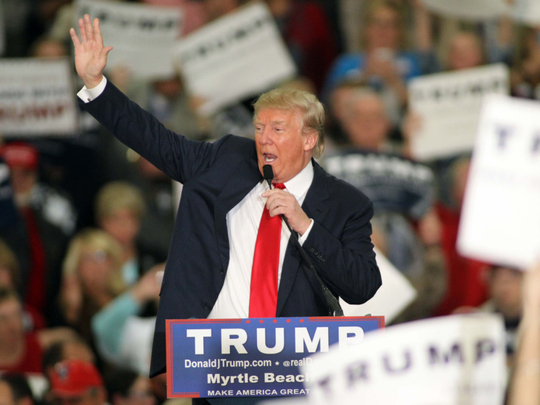
The American novelist, Sinclair Lewis, is supposed to have said: “When fascism comes to America it will be wrapped in the flag and carrying the cross.” It has long been easy — far too easy — to write off Donald Trump as a self-promoting celebrity with little chance of winning the White House. His chances remain low (Nate Silver, the guru of election data, puts them at 10 per cent, which is nevertheless five times more than when he started). But our lens is still too rosy. Whether Trump defies the odds, or eventually fizzles out, is beside the point.
The outrageousness of his success has paved the way for others to try. Trump’s invective has disrupted the character of American politics. It will be hard to undisrupt. For proof of that, look no further than Trump’s “moderate” rivals in the Republican race. Instead of offering an alternative, mainstream candidates are moving ever closer towards Trump’s nativism. Jeb Bush, the original establishment favourite, now believes the United States should only accept Syrian refugees if they are Christian. Earlier this year, Jeb had referred to children of undocumented aliens as “anchor babies” — so named because the illegal immigrants allegedly come to the US to ensure their unborn will have citizenship.
Contrast this to what he said in February before Trump entered the race: “We should welcome all immigrants,” Jeb told the Chicago Council on Global Affairs. “[As Americans] we come in 34 different flavours.”
Chris Christie, the ultimate moderate, since he governs the Democratic state of New Jersey, believes the US should accept no Syrian refugees at all regardless of religious background, even if they are “three-year-old orphans”. In response to Trump’s repeatedly falsified claim that he watched thousands of American Muslims in New Jersey cheering the fall of the Twin Towers on 9/11, Christie said: “I think if it had happened, I would remember it, but, you know, there could be things I forget, too.”
Meanwhile, John Kasich, the Governor of Ohio, and the ultimate insider, last week said that the US should set up a federal agency to promote Judeo-Christian values. Until Trump, most Republicans rejected the “clash of civilisations” view of the world. Now it is normal. With rivals like this, does Trump need friends? It will become ever harder for the likes of Messrs Bush, Christie and Kasich, to disown what they have said. All three have tried to qualify their various Trumpist lapses.
But such straying is occurring more often and few notice their qualifications. Moreover, their self-editing reinforces Trump’s contention that the Republican establishment is run by a bunch of mealy-mouths who lack conviction. It is a narrative eerily redolent of the debate between demagogues and their detractors in the 1930s. Father Charles Coughlin, the Trump of 1930s America, said: “When we get through with the Jews in America, they’ll think the treatment they received in Germany was nothing.” Trump talks of Syria’s huddled refugees as “Trojan horses” for Daesh (the self-proclaimed Islamic State of Iraq and the Levant).
One lesson of Trump’s rise is that voters reward clarity. Having already muddied the waters, moderates are in little position to bring Trump down when they think he goes too far. Last week, he said there should be a database of Muslim Americans. He even hinted that they should carry identity cards. Few paid attention to his rivals’ tut tutting.
The Republican establishment is paralysed with fear. Appeasing him makes him worse. This is what The Donald tweeted about Kasich when he visited the latter’s home state: “Going to Ohio, home to one of the worst presidential candidates in history — can’t debate, loves Obamacare ...” The chances are that Trump will join Father Coughlin in the political hereafter. But his brand of politics has already been validated.
— Financial Times









